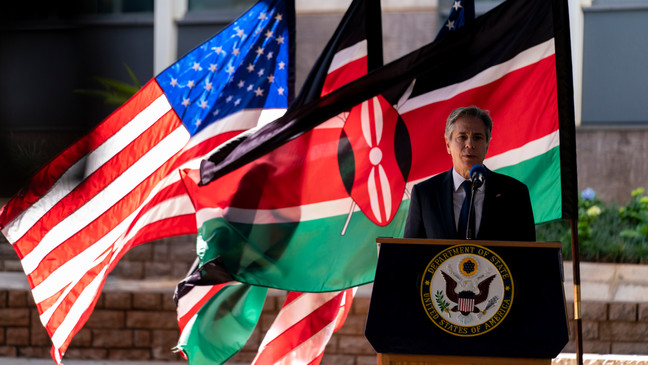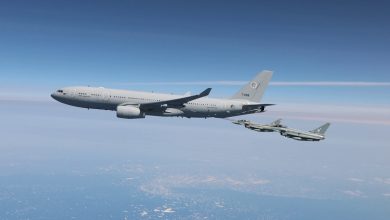Analysis: Political arrogance wiped out US influence in Africa

As Moscow shifts its focus to the European front, African allies may lack support, risking political and military instability in the region.
After the military coup in Niger on July 26, the United States urged the military junta to transfer governance to a democratic civilian government. Over the past eight months, the Washington administration has pursued various initiatives on this front. Most recently, in the past weeks, the U.S. State Department announced that Assistant Secretary for African Affairs Molly Phee and Gen. Michael E. Langley of the U.S. Marine Corps would visit Niamey on March 12-13.
Phee and Langley have engaged in discussions with the National Council for Safeguarding the Homeland (CNSP) in Niamey since August, aiming at democratizing Niger. However, this time, the American delegation faced unexpected resistance. Initially, the meeting request from the American delegation, led by Phee and Langley, was denied by Gen. Abdurrahmane Tchiani, the leader of the Niger junta. Subsequently, the planned press conference at the U.S. Embassy in Niger was also rejected.
Following these harsh attitudes toward the U.S. delegation, Nigerien junta spokesperson Amadou Abdramane made a speech on TV on March 16. Abdramane began his speech by stating that the Nigerien government condemned the condescending attitude of the U.S. delegation, which would damage the long-standing relationship between the two countries. In the continuation of his speech, he stated that the U.S. delegation accused Niger of making a secret agreement to supply uranium to Iran and that this was similar to American accusations in the Second Iraq War.
Reacting to the U.S. objections to the allies chosen by Niger in foreign policy, Abdramane responded to the Washington administration’s attempt to deny the sovereign people of Niger the right to choose these allies and the type of beneficial partnership to be developed. Finally, it was announced that Niger’s military relations with the U.S. were terminated and that approximately 650 military and civilian personnel on American bases could no longer stay in Niger.
Shift in African Sahel: Dissatisfaction, neocolonialism
The main reason for these developments is the dissatisfaction of African states in the Sahel region regarding relations with Western actors in recent years, the desire to get rid of neocolonial policies and the aim of diversifying the actors they cooperate with in foreign policy, and the harsh reaction of Western actors such as France and the U.S. to this situation. Western actors, especially France and the U.S., attach great importance to Africa, whose importance has increased in recent years with its geostrategic importance and natural and human resources, and are trying to increase their influence in the region.
However, on the other hand, African states that have not been able to find what they expected from these Western actors, especially in areas such as security and economy, in the spiral of unequal relations that have been going on for many years, have started to increase their cooperation with new actors such as Russia, Iran and Türkiye, who are trying to increase their influence on the continent and promising important cooperation in the areas where they are needed. In fact, in the Sahel region, in recent years, African political elites, who had strong relations with former colonialist countries such as France for their interests and did not take into account the demands of their society, were removed from power by military interventions. Although these military interventions harmed democracy, African people supported the coup plotters in their countries to make radical changes in political mechanisms to live in peace and prosperity. As a matter of fact, the demonstrations of the Nigerien people’s support for the soldiers in the streets of Niamey after the military intervention in Niger in July is the most important example of this situation.
France and the U.S., which are rapidly losing their power and influence in sub-Saharan Africa, are trying to maintain their presence in the continent through various initiatives. After the Niger coup, France and the U.S. supported the ECOWAS term president and Nigeria’s newly elected President Bola Ahmed Tinubu, in his efforts to return the country to democratic constitutional conditions. There is support from Paris and Washington behind Tinubu’s statements that even a military operation could be organized for this purpose. However, this Western strategy backfired (failed) and anti-Western sentiment in the Sahel region increased. First, Mali and Burkina Faso, which had previously had a military coup and were governed by a military junta, declared their support for the junta in Niger and declared that a military attempt on Niamey would be a declaration of war. Then, on Sept. 16, military leaders in Mali, Burkina Faso and Niger signed a mutual defense agreement. The agreement known as the “Liptako-Gourma Regulation” officially established the Alliance of Sahel States (AES).
With the establishment of this alliance, the crack within ECOWAS grew further and a suitable atmosphere emerged for cooperation with new actors, especially Russia, in the Sahel region, freeing itself from Western influence. As a matter of fact, Niger took advantage of this favorable atmosphere and started to move closer to Russia to get out of the difficult situation it fell into after ECOWAS’s sanctions decisions. First of all, a Russian delegation went to Niger in December 2023, and more recently in January, Niger Prime Minister Ali Mahamane Lamine Zeine went to Moscow. Following these meetings, it was decided to strengthen cooperation between Niger and Russia, especially in military matters. As a result, Russia strengthened the military structure in West Africa, which it called the “Africa Corps” after the Wagner Group, and increased its presence in the region.
The junta administration in Niger similarly tried to strengthen its relations with Iran. Following his visit to Moscow, Nigerien Prime Minister Zeine went to Tehran and held meetings with Iranian First Vice President Mohammad Mokhber. Mokhber condemned the sanctions decisions taken by ECOWAS and the Western actors against Niger and emphasized that both countries have similar experiences. Following the meetings in Tehran, various cooperation agreements were signed between Niger and Iran in the fields of economy, energy and health. Apart from these developments, the anti-Western developments in Mali, Burkina Faso and Niger were interpreted by Iranian President Ibrahim Raisi as the resistance of African countries against hegemonic European policies and colonialism. Raisi announced that he also supports the struggles of these countries.
Türkiye-Niger relations
Another country with which Niger tried to strengthen its relations against the West was Türkiye. On Feb. 1, Niger’s Prime Minister Lamine Zeine came to Ankara upon the invitation of President Recep Tayyip Erdoğan. In the closed-door meetings between Zeine and Erdoğan, political and economic relations between the two countries, the fight against terrorism, and regional and global issues were discussed. Following the meetings, President Erdoğan announced that he was against foreign military interventions that victimized the people of Niger and that Türkiye supported steps to strengthen Niger’s independence.
As a result, like Mali and Burkina Faso, Niger has turned to cooperation with new actors to destroy the West’s patronizing attitude and put an end to neocolonial policies. The U.S., on the other hand, lost its presence in Niger, which is vital for carrying out its operations in North and West Africa, due to the harsh attitude it took in an attempt to control Niger. As remembered, the U.S. decided to build a base called “Niger Air Base 201,” 5 kilometers (3.11 miles) southeast of Agadez in Niger, in 2016 and spent $110 million on the construction of the base. For the annual maintenance of the base, which is known as the most expensive base in the U.S., $30 million is spent by the U.S. Treasury. This base was used as the central intelligence and surveillance center of the U.S. in the Sahel. The base has also been of great importance in the fight against al-Qaida and Daesh-related terrorist organizations in the region since 2019.
Recently, Abdramane announced that the U.S. would no longer have military and civilian personnel at this base. This is indeed a great loss for the Washington administration. As a matter of fact, the Washington administration had provided more than $500 million in military aid to Niger in the field of security until 2023. Niger was its most important ally in the region to increase its gradually decreasing influence in the area. At this point, all these efforts of Washington have failed, and the American influence in the region has begun to disappear due to the supremacist and dysfunctional policies followed in recent years.
It is quite obvious that these developments will have a great impact on the region. In particular, the activities of radical organizations in the region after the coup will increase further with external support. The new military structure, which has not yet been fully formed, may also be ineffective against these threats. On the other hand, Russia, Niger’s (like Mali and Burkina Faso) most trusted ally in the fight against terrorism, may face new military struggles in Europe after Ukraine. For this reason, while the Moscow administration has shifted its entire focus to the European front, it may be unable to provide sufficient support to its African allies. This may expose African peoples to a new threat of political and military instability in the near future.
Source: DailySabah





